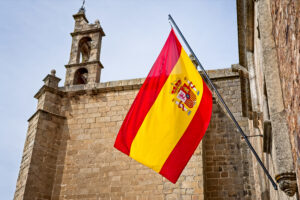Defenders of the faith
Defenders of the faith
When Pope Francis became the leader of the Catholic faith in 2013, many progressives hoped it would lead to a more liberal Vatican. Yet, far-right parties across Europe, for example Vox in Spain, have made a clear challenge to both Francis’ politics and leadership.
Across Catholic European countries, far-right parties have provided a direct challenge to the liberal direction in which Pope Francis has tried to move the Catholic Church since he ascended to the papacy in 2013.
Over the last two years, this political tension has been exacerbated in Spain, with the far-right Vox party growing rapidly and placing their supposed defence of the Catholic faith at the centre of their conservative political platform. This article will therefore look to tackle two questions. Primarily, the ways in which Vox’s political platform has much in common with the Catholic Church in terms of social questions. Yet, on the other hand, it will discuss how Vox’s refusal to follow the more liberal positions of the Vatican on questions such as the economy and migration are a direct threat to Pope Francis’ vision.
A new political force on the Spanish right
Since 2019, the far-right Spanish political party, Vox, has started to make major gains in Spanish politics, most notably finishing as the third-biggest party in the November 2019 elections.[1] However, before going further with this article, it is important to acknowledge that although they do share certain positions with the Catholic Church, there has been no public relationship or endorsement between the church and the party itself.[2]
Vox’s rise has been partially formed by the election of a left-wing coalition which describes itself as the ‘most progressive government’ in Spanish history and came to power following the November 2019 elections. The platform of social policies brought forward by this platform has often meant that both the Church and right-wing parties have ended up forming part of the same opposition to them.[3]
One of the clearest examples of this convergence has been regarding the legalisation of euthanasia, which was passed by the Spanish parliament in early 2021 and was strongly opposed by both Vox and senior members of the Catholic Church.
Not only was this opposition shared, but it was often expressed in strikingly similar terms. For example, in December 2020, the Vox leader, Santiago Abascal, made a statement in which he condemned the legalisation of euthanasia as being a ‘victory for the cultura de muerte’ (meaning ‘culture of death’ in Spanish).[4]
Criticism from the Spanish Catholic clergy has often used similar vocabulary when speaking of the legislation regarding euthanasia. One Bishop alleged that the government wished to turn Spain into an ‘extermination camp’, whilst the diocese of Vitoria criticised the federal institutions for pursuing a ‘cultura de muerte’.[5] [6] Meanwhile, a series of Catholic civil organisations who hold hardline conservative positions have organised protests and events which have criticised the new law.[7]
This shared position on the issue of euthanasia can also be seen in other controversial social issues which have formed a part of the new government’s legislative plans. For example, Vox and the Catholic Church are both strong critics of the state’s support for abortion clinics and new laws which will change, and in effect reduce, the teaching of religion in Spanish schools.[8]
Going beyond opposition
However, Vox has not only opposed new laws that challenge conservative Catholic values, but has gone further by actively seeking opportunities to present themselves as defenders of the faith.
This was particularly evident in a recent campaign coordinated by Vox’s various branches across Spain. They demanded that the Christian cross be considered a ‘Bien de Interés Cultural’ (a shared cultural property) and therefore receive special judicial protection. As party leader Abascal explained, this policy would “aim to stop the offensive against religious symbols and feelings.”[9]
Furthermore, Vox also caused controversy in 2019 by demanding that the mosque-cathedral in Cordoba no longer be referred to in any way as a ‘mosque’.[10] Similarly, they have maintained close links with an ultra-conservative organisation named the Christian Lawyers, who have pursued hardline positions on various social issues relating to Catholicism over the last decade, including education and blasphemy.[11]
A clash with the Vatican
As a result, rather than just oppose the progressive changes that challenge Catholic doctrine, Vox have shown that they wish to actively pursue political campaigns based on their supposed ‘defence’ of the faith.
However, this emphasis on Catholicism as part of their political platform has also led them to clash with the more liberal turn taken by Pope Francis since 2013. In particular, Vox’s views on economics have often been directly opposed to those promoted by the Church. This was most notable in April 2020, when Spanish progressive parties criticised Vox for failing to listen to the pope’s support for the idea of universal minimum incomes as a means of combating poverty.[12]
Furthermore, Vox has also maintained a strong position against progressive ideas about migration and the refugee crisis. Whilst Francis has repeatedly called for Catholics to welcome and provide aid to migrants, Vox, like other far-right European parties such as the Lega in Italy, have campaigned vigorously against these types of policies.[13] [14]
A long-term challenge
The way in which Vox has emphasised Catholicism in their political strategy is evidence of a wider problem that faces Pope Francis’s attempts to take the Vatican in a more liberal direction.
Although there continues to be agreement on long-held social values, such as those regarding euthanasia, abortion, or education, Vox has also had no fear in expressing that they do not agree with Pope Francis on political questions such as the economy or migration. In addition, Vox has also been open in their desire to protect a conservative understanding of Catholicism in Spain from those who, in their view, wish to undermine it.
As the number of practising Catholics in Spain continues to decline, with the majority of young people not being religious, it is clear that Vox wishes to position themselves as the party that will defend religious traditions and policies.[15] This is both a significant challenge to the legitimacy of Pope Francis as well as to the unity of the Catholic Church’s leadership and its followers. How this situation develops will be an important question in years to come, not just in Spain, but across Europe.
Interested in similar topics? Go to our Dashboard and get free updates.
Sources
[1] Spanish election 2019: full results | World news
[2] Poland’s Rise in Populism – UAB Institute for Human Rights Blog
[3] Toni Strubell, Núria Bassa – One year into Spain’s “most progressive government in history”
[4] Abascal: “La Ley de Eutanasia abre las puertas al homicidio legal”
[5] Reig Pla acusa al Gobierno de “convertir España en un campo de exterminio”
[6] La Iglesia de Vitoria organiza unas jornadas “en defensa de la vida” para mostrar su rechazo a la ley de eutanasia
[7] La ultraderecha católica prepara su ofensiva en las calles contra el aborto y la eutanasia
[8] La ultraderecha católica prepara su ofensiva en las calles contra el aborto y la eutanasia
[9] VOX reclama que la cruz cristiana sea considerada Bien de Interés Cultural
[10] ¿Mezquita o catedral de Córdoba?: La polémica reivindicación de Vox
[11] El lobby ultracatólico vinculado a Vox amenaza con llevar ante los tribunales al Gobierno
[12] La respuesta de Abascal sobre el Papa Francisco que no le va a hacer ni pizca de gracia a los votantes católicos de Vox
[13] Vox figuró en la entrevista al Papa Francisco – José Apezarena
[14] Italy news: Pope Francis CHALLENGES Matteo Salvini’s anti-immigration policies
[15] España deja de ser católica: ya hay más ateos y no creyentes que católicos practicantes






